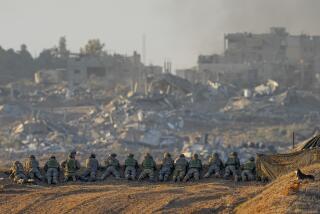Confrontation in the Persian Gulf : But Jackson Questions Policy : Both Parties’ Candidates Generally Support Action
- Share via
Democratic and Republican presidential candidates Monday generally supported U.S. attacks on Iranian targets in the Persian Gulf, although the Rev. Jesse Jackson said the crisis raises new questions about U.S. policy in the region.
Jackson, who voiced support for the Administration’s decision, said: “If we defend our soldiers who are in the gulf, it’s the right thing to do. On the other hand, they are there in the cross-fire of a very ineffective and bad policy.
“The issue is not what we do in the short run--of an eye for an eye or a shot for a shot,” he said, arguing that while U.S. forces should continue to play a role in the gulf to defend U.S. interests, the United States, under the auspices of the United Nations, must seek more actively to end the Iran-Iraq War.
Vice President George Bush, the probable GOP presidential nominee, blamed “aggressor” Iran for Monday’s fighting and defended the United States’ military response.
“We’re not going to back down . . . nor will the allies there with us in the gulf,” Bush said in a televised interview while campaigning in Ohio.
“We made a proportional response, and they should stand down. But if they’re going to hit American assets or allied assets, they should be prepared to pay the consequences.”
Present at Planning Sessions
A Bush aide said the vice president attended a National Security Planning Group meeting Friday night at which actions against Iran were discussed. He also took part in meetings with President Reagan, top executive branch aides and congressional leaders Sunday night at which the American response was formulated, according to Bush’s chief of staff, Craig Fuller.
At a meeting of the Toledo Rotary in Ohio, Bush interrupted his stump speech to give Rotarians an update on the situation in the Middle East and said he hoped that Iran would “draw the proper, appropriate conclusion” from the firepower aimed at their installations.
“We’ve taken a measure of military action today to make certain that the Iranians have no illusions about what happens when you have irresponsible behavior,” he said.
In local television interviews in Cleveland, Bush sought to downplay the seriousness of the Persian Gulf confrontation when asked if it might lead to an extended conflict.
“I wouldn’t worry about that. . . ,” he said. “Iran knows they would be stupid to go to war with the United States; and remember, there are five allied countries supporting us, and we’re supporting them in the gulf as well.”
Gore Backs President
Democrat Albert Gore Jr., who has supported the Administration’s Persian Gulf policy, said he believed that Reagan took the right action.
“Based on the facts that were available to me, it seemed justified,” the Tennessee senator told reporters while campaigning in New York. “I have no qualms about the way the action was handled. Overall, our operation in the Persian Gulf has been a success.”
But Massachusetts Gov. Michael Dukakis sidestepped the issue, saying, “We just don’t have sufficient information for me to comment on what’s happened in the Middle East in the last few days, and it would just be inappropriate for me to comment.”
Earlier in the day, Dukakis urged the international community to work within the U.N. Security Council to halt the escalating war in the gulf. Dukakis told Reuters news service that the U.S. attacks were a “measured response,” but he repeated a call for a multilateral peacekeeping force in the gulf.
More to Read
Get the L.A. Times Politics newsletter
Deeply reported insights into legislation, politics and policy from Sacramento, Washington and beyond. In your inbox twice per week.
You may occasionally receive promotional content from the Los Angeles Times.











